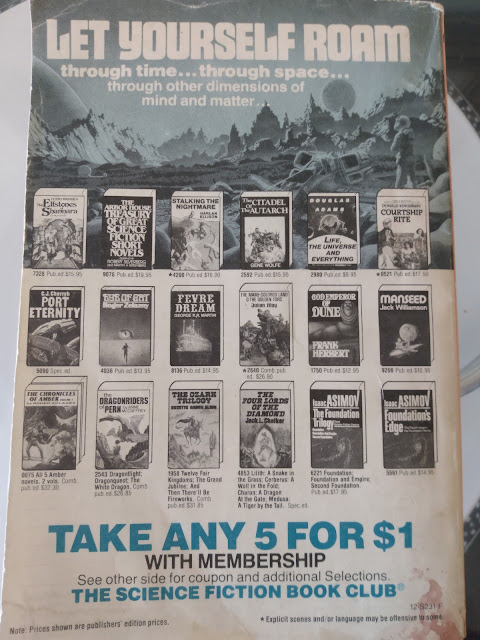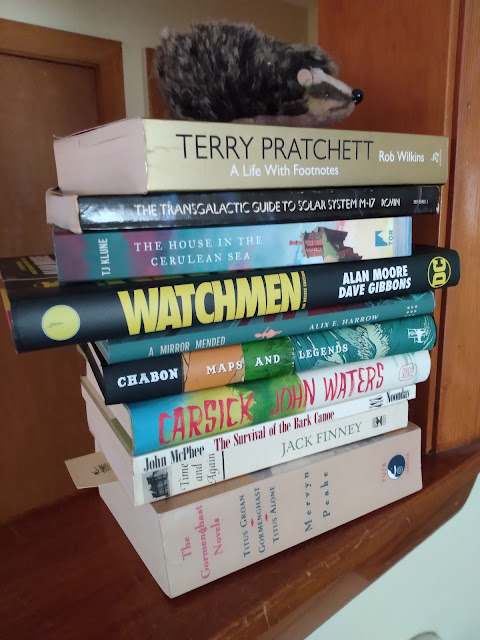The Jungle, by Upton Sinclair - I found this in a little free library late in the month, and thought I knew the gist of it despite never having read it. It seemed topical (UNFORTUNATELY) so I decided to give it a go. This is an "enhanced" edition, apparently intended for schools or reading groups - I appreciated the extra context the prefixes and suffixes supplied. The book itself is wrenching, and I can understand the impact and outrage it created when it was published. Knowing it was a protest novel, I should have been more prepared for the long speeches at the end, but it did feel like a kludge still. On the whole, I can't say I'm glad I read it, but I think it was important to finally do so, and I'll be thinking about it for a while (UNFORTUNATELY).
Oglaf: Book Four, by Trudy Cooper and Doug Bayne - They keep churning out hilarious filth, what else can I say. I loved the introduction of Wobbly John, God of Lies.
H. P. Lovecraft's The Call of Cthulhu, by Gou Tanabe - My wife picked this up for me for Halloween, but it arrived a few days late. No matter, November was still plenty spooky. This is a manga adaptation - I've read a few other of Tanabe's works in the same vein. This one again shows his skill at capturing a sense of huge scale in small, black-and-white pages. It varies the original less than some of his other works.
Dominic, by William Steig - I've had this for years and pulled it off the shelf on a whim. It's a book for older children, so not a challenging read, but share that same deeply weird, almost stream-of-consciousness feeling of Steig's other stories, amplified greatly by his sketchy illustrations. More children's books should use words like "seneschal", especially when describing a peacock.
Ubik, by Philip K. Dick - My mother in law brought this over, thinking I would like it. I realized that somehow I'd never actually ready any PKD, so this was my first experience with an original instead of a movie adaptation. Shame I've been missing out all these years! I can see how this has influenced so many of the authors and stories I have read, and I'm going to be seeking out more, both for the stories' own sakes and to fill in some cultural gaps. I do have to say the last chapter felt a little schlocky or cheap, though.
Ozma of Oz, by L. Frank Baum - A well-weathered little free library find. This and The Marvelous Land of Oz were broken apart and remixed into everyone's favorite fever-dream childhood film Return to Oz, so you know there's some extremely bizarre notions and characters zipping around in here. Ozma hasn't reached the godlike levels of power she has in the later books, so there's some actual conflict here resolved through some classic fairy-tale logic.
The Cat in the Hat, by Dr. Seuss - My nephew came to visit, so I had the box of kid's books out. After he left, I pulled out this classic and read it for the first time in a while. Still clever! I tried to give and adult eye to the structure of the rhyme and the illustration technique - he was definitely crafting something here instead of churning out whatever the publishing industry of the time wanted. It worked out well for him, I think we can safely say.
Meddling Kids, by Edgar Cantero - An early Christmas gift from my sister. I very much enjoyed this "What Ever Happened To...?" approach to the slew of 70's teen sleuth stories. Clever writing and dialogue, good amount of pathos without being sappy, a few genuinely scary scenes, all bound together by a mystery that skips back and forth between the decades - it was a romp. I'm passing it on to my brother as an on-time Christmas gift.
The Monsters Know What They're Doing, by Keith Ammann - Another early Christmas gift from my sister in the same visit. It was a little odd reading this right as 5th edition is shifting minor versions and the monsters haven't been published yet, particularly with the changes in attitude towards innate alignments for humanoids that's happened in the past decade. But it was really great bathroom reading, and I'll take a few ideas away for my table.












